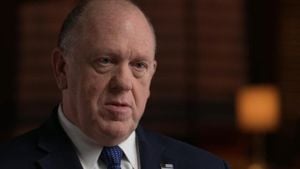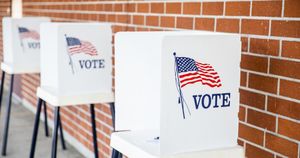On Thanksgiving, as families across Connecticut gathered for holiday feasts, the dark cloud of bomb threats loomed over the state’s political leadership. U.S. Senator Richard Blumenthal was seated at his Thanksgiving dinner when he received distressing news: nearly the entire congressional delegation representing Connecticut had been targeted with bomb threats.
Although Blumenthal personally was not among those threatened this time, he recounted his experience with threats just weeks prior. Standing outside the State Capitol the following Friday, he conveyed, "I have no explanation for why I didn’t receive a threat, but I will say yesterday’s threats were not an isolated incident. We receive them periodically." His tone reflected both concern and resignation, stating, "Unfortunately, very regrettably, they are part of our life." Indeed, threats against public officials have become disturbingly common.
Every member of Connecticut’s U.S. congressional delegation, including Blumenthal and Senator Chris Murphy, received alarms about potential threats. All five of the state’s representatives released statements recognizing the seriousness of these incidents and thanking local and federal law enforcement for their swift responses. “There is no place for political violence in this country, and I hope we can continue through the holiday season with peace and civility,” remarked Rep. Jim Himes, echoing the sentiments shared by his peers.
The nature of these threats is alarming, but the specifics remain murky. Law enforcement has not offered extensive details about the incidents, citing the need to protect investigations and prevent potential copycat acts. A spokesperson for the U.S. Capitol Police validate the emergence of these threats, calling it part of their protocol to collaborate closely with local agencies. “To protect the integrity of our work and investigation, we cannot provide more details at this time,” the spokesperson noted.
Interestingly, this coordinated effort involved not just Connecticut officials but also aimed at public figures beyond its borders. Murphy’s home was cited as one of the locations targeted, and local police quickly responded, determining there was no genuine threat involved.
Such bomb threats aren’t just random instances of paranoia but are part of a troubling trend. Bobby McDonald, a seasoned University of New Haven professor with extensive experience at the U.S. Secret Service, provided insight: “It’s really gotten worse with the political rhetoric out there. People are getting charged up and sometimes saying things they probably shouldn’t be saying or doing things they shouldn’t be doing.” His observations align with studies showing threats against public officials have increased, particularly amid the political upheaval witnessed during and post-Trump’s presidency. The political climate, anxiety, and the spreading of misinformation can potentially exacerbate these threats.
A recent study found threats against officials have steadily risen since Trump took office, with spikes particularly noted from 2017 to 2021. While there has been slight decline since, the frequency remains alarmingly high compared to pre-2017 levels. This is certainly worrisome, as it signifies not merely isolated incidents, but rather systemic issues within the political discourse.
When discussing solutions or protections against such incidents, both McDonald and Blumenthal agreed on the need for vigilance but differed on immediate security needs. Blumenthal expressed his belief in the current levels of safety provided by state and local authorities and did not see the necessity for additional security measures. “I feel pretty secure with the level of protection we have now,” he remarked confidently, showing trust in the systems established around him.
Reflecting on the timing of the threats, McDonald suggested the holiday season, often laden with personal stresses for many, could be linked to heightened aggression toward visible public leaders. “For some folks, the holidays aren’t the happiest time, especially if they're dealing with mental health issues or family troubles. Unfortunately, this is how they take it out: on their elected representatives,” he pondered, shedding light on the psychological factors potentially at play during such threats. It’s troubling to think how mental health crises can spiral out and manifest as aggression toward political figures.
The barrage of threats against Connecticut’s congressional members raises pressing concerns not merely about safety but about the very health of political discourse and engagement. Amidst rising concerns about political violence and tensions following the attack on the Capitol, law enforcement agencies recognized the importance of treating every threat seriously, even if many turn out to be empty bluster.
Despite the alarming frequency of these incidents, there’s hope to be gleaned from the responses by Connecticut's leadership. These officials are not shying away from their responsibilities or their public service roles, even amid threats. Each statement shared post-incident emphasized hope for civility and the rejection of violence—messages aimed as much at the public as at the assailants themselves. Beyond just safety, there’s also this notion of resilience circulating among Connecticut’s officials, as they continue their work regardless of intimidation attempts. This serves to remind us all: even when shadowed by threats, the spirit of public service and accountability perseveres.
Given this, the collective response municipalities and constituents must take is one of actionable unity against fear-mongering. Public discussions surrounding political accountability, civility, and the need for shared solutions become ever more pertinent. Engaging the populace through constructive dialogue about such threats may help reduce tension levels and build bridges across community divides. Each time officials continue their work, it speaks volumes, showcasing the importance of resilience, responsible conduct, and most of all, civility.
While threat levels may fluctuate, the call for peace and stability is unwavering. Even more than before, it is clear: bomb threats against public officials, including Connecticut’s leadership, highlight the pressing need for communal conscience, ensuring safety not just physically, but mentally as representatives aren’t merely political actors but symbols of hope for their constituents. This season, perhaps more than any other, may well be the moment we take stock of how we treat our leaders and how we expect them to treat each other. After all, it’s not just about them—it’s about all of us working together, fostering environments free of hostility, where hope flourishes, and kindness prevails. The uncertainties of our political climates should challenge us to do the opposite: to band together, support our leaders ethically, and drive the message of peace home, ensuring even the toughest of times do not dictate who we are as individuals or as citizens of Connecticut.



